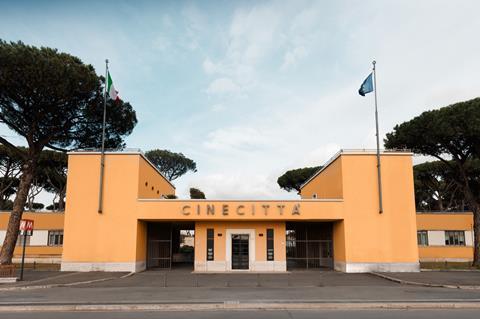
Manuela Cacciamani, the CEO of Italy’s iconic studio complex Cinecittà, has unveiled an aggressive business plan designed to cement the facility’s position as one of Europe’s premiere production hubs.
At the launch of the business plan in Rome this week, Cacciamani, who took over last year, said she is conscious of fierce global competition for international productions even as the studios operate at maximum capacity through 2025.
Cinecittà’s ambitious five-year business plan is targeting a doubling of annual revenues to €51.9m by 2029 while achieving a €4.3m net profit.
This would mark a turnaround from 2024’s performance, when the facility posted €26.7m in revenues and a net loss of €11.6m, in the wake of the US actors and writers strikes which slowed international shoots.
Speaking to Screen, Cacciamani outlined her vision for the Rome-based complex, which has been running at 100% occupancy since she took over from predecessor Nicola Maccanico in 2024. “We’re not just maintaining momentum, we’re looking now to accelerate it,” she said. “Every soundstage is booked solid, and we’re having to turn down requests for the last quarter of 2025.”
The facility is hosting major productions including Mel Gibson’s The Resurrection Of The Christ, Ridley Scott’s The Dog Stars, and the sci-fi thriller White Mars starring Luke Newton and Lucy Hale. International shoots now comprise 70% of all productions.
The facility also handles post-production work, with recent high-profile projects including Robbie Williams biopic Better Man, Jacques Audiard’s Emilia Pérez and Roland Emmerich’s Those About To Die series.
Cacciamani’s strategy centres on an expansion of production capacity, increasing the number of soundstages from 20 to 25 by June 2026 through €300m in EU recovery fund investments.
“Competition has become frenzied on a global scale,” Cacciamani acknowledged. “We’re competing with Malta extensively, with Hungary and Spain, but also with Germany and France.”
Cacciamani said Italy’s tax credit for international film and TV shoots continues to be a big draw for productions. “The confirmation of the international tax credit at 40%, among the most competitive in the world, is an additional favourable point for the attractiveness of the studios for foreign productions.”
But she acknowledged that the tax credit for domestic productions continues to be plagued by issues, adding that she hoped the situation “will be resolved in the coming weeks.”
Production background

Drawing on her previous background as a producer of features, TV movies and shorts, Cacciamani said she leverages her production experience and personally handles much of the international sales effort.
“You lose if you think you can win this game on pricing alone,” she explained. “It’s won through genuine one-to-one relationships. You need the willingness and ability to take risks, to approach someone who would never come to you naturally.”
“I work the commercial side myself, which helps because I come from this world. I’ve been immersed in it for decades,” she said.
Cacciamani’s plan emphasises technological investment, particularly in virtual production capabilities. The facility’s Theater 18 houses one of Europe’s largest virtual stages, while plans include expanding VR and motion-capture capabilities and developing “hybrid production environments”.
The planned expansion will bring total soundstage space to 21,000 square meters with a 10-hectare backlot, positioning Cinecittà as one of Europe’s largest production facilities.
“Italy has an extra gear when it comes to craftsmanship and artisanship,” Cacciamani added, highlighting what she sees as a key competitive advantage. “This attention to detail is our competitive edge in terms of strategy.”
The CEO said other countries were seeking to replicate Cinecittà’s craft offering. “I’ve been contacted by several nations asking me to train their people. Countries like Saudi Arabia have enormous investments but they’re missing that special something. They know it – they’re very aware of what they lack.”
With studios booked through 2025 and strong interest for 2026, Cacciamani projected the facility will be able to return to profitability while funding continued expansion. The new facilities should be operational by early 2026, ahead of Cinecittà celebrating its 90th anniversary in 2027.















![[L-R]: Amanda Villavieja, Laia Casanovas, Yasmina Praderas](https://d1nslcd7m2225b.cloudfront.net/Pictures/274x183/6/4/1/1471641_pxl_20251224_103354743_618426_crop.jpg)









No comments yet